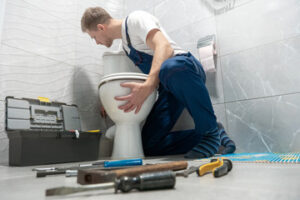Plumber Granada Hills are responsible for maintaining the water supply, drainage, and sewage systems in homes and businesses. They work closely with clients to understand their needs and provide advice and recommendations.

The job requires physical strength and stamina as well as dexterity to manipulate small parts and tools. Plumbers also need critical thinking skills to assess issues and find effective solutions.
The inlet screen is a very important part of the sump pump and it can often be clogged with sediment. This is a problem that can lead to water starvation. Plumbers can usually clean these screens with needle nose pliers. If they are too clogged, they will need to be removed and replaced. The water inlet was designed with a lot of thought and the screens are a very important part of this. Getting them too clogged will cause problems with the actual appliance.
Inspect the Discharge Pipe
In order to identify and correct plumbing issues, plumbers must perform routine inspections. These can include using specialized equipment such as video cameras to inspect pipes and pressure gauges to test for leaks. After completing the inspection, the plumber must determine the cause of the problem and decide on a plan to fix it.
Plumbers also have to be able to accurately interpret blueprints and building codes in order to properly install plumbing fixtures and appliances. They also need to be able to recognize potential hazards associated with certain jobs, such as working with gas lines or sewage systems that contain dangerous microbes.
Another important skill for plumbers to have is customer service. Because they often work directly with clients, they need to be able to communicate clearly and explain complex issues in an understandable way. They also need to provide accurate estimates for their work.
Plumbing is a career that requires a lot of training and education. Most plumbers receive their training through an apprenticeship, which combines classroom instruction with paid on-the-job training. After completing the apprenticeship, plumbers must pass an exam to become licensed.
The licensing requirements for plumbers vary by state and municipality, but most require a high school diploma or equivalent and a year or more of related work experience. They also need to pass a background check and drug screening. Many plumbers also choose to become certified in specific areas of plumbing, such as septic systems and backflow prevention devices.
As the population ages, the need for plumbing services will continue to grow. Plumbers who are licensed and trained can meet this demand by offering a wide range of services, including installing new plumbing systems in homes and businesses and repairing existing ones. They can also help people conserve water by performing routine maintenance and installing energy-efficient fixtures. In addition, they can help homeowners and business owners avoid costly repairs by identifying and addressing potential problems before they become serious.
Inspect the Motor
The motor of a sump pump is crucial to keeping the basement and house dry, so it’s important to check on it frequently. If it’s running without any water to pump, it’s time to call a plumber. Leaving the motor to run without water can cause it to burn out or even burst into flames, so it’s essential to inspect it regularly and make any necessary repairs as soon as possible.
Plumbers are skilled professionals who specialize in the installation, repair and maintenance of water systems. Their work ensures that all plumbing fixtures and appliances function properly – from toilets and taps to heating systems and drainage networks. They also offer services that are tailored for commercial and residential spaces.
The path to becoming a plumber starts with a high school diploma or equivalent and an apprenticeship, which offers classroom learning and paid on-the-job training under the supervision of a certified journeyperson. Apprenticeships last from four to five years and include 2,000 hours of classwork, as well as hands-on experience working on actual job sites. Once a plumber has completed their apprenticeship, they must pass an exam to obtain a license to practice independently.
Depending on their specialty, plumbers can further refine their skills through various certifications. These additional qualifications can help them stand out to potential employers or customers, and may even lead to higher pay rates. For example, plumbers who are certified in green plumbing practices can use their skills to save clients money on energy costs.
While most plumbers perform routine tasks like installing toilets and faucets, others may work on more complex projects, such as relocating pipes or sewer lines or replacing water heaters. All of these projects require strong problem-solving skills to assess a situation and determine the most effective solution.
Another common duty of plumbers is to advise their customers on how best to maintain their plumbing systems between service visits. This requires excellent customer service skills, as plumbers must be able to communicate clearly with their clients and listen to their concerns. They should also be able to explain complicated issues in ways that are easy for their clients to understand.
Inspect the Battery
Plumbers are responsible for a wide range of plumbing services, including laying pipes, setting toilets, installing faucets and appliances like dishwashers and washing machines, and resolving any problems with these systems. They are often involved in new construction projects from the outset, working from blueprints and architectural plans to design and install the necessary plumbing infrastructure for buildings. Many states and municipalities, require plumbers to obtain licenses and certifications before they can work.